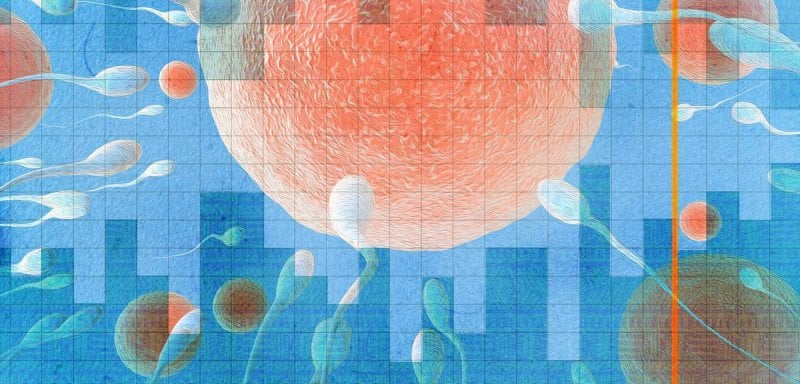
This report comes as part of the "Not on the Margins" project, which sheds light on freedoms, and sexual and reproductive health and rights in Lebanon
Before getting married, Nabila Youssef and her partner planned to start a family of "at least four children" because "wealth and children are the joys of life, and children are the most beautiful thing in the world", and also "so that we would become a family”. But the "state of everything" in Lebanon forced them to change their plans and settle for the two children they had before the economic and living conditions in the country deteriorated.
Nabila, 38, lives in the village of Bchamoun in Mount Lebanon governorate. She tells Raseef22, “We had a boy and a girl, and frankly, we stopped thinking of having a third child because if we want to have one, we would have to think about him and his life in the turbulent situation we live in," pointing to the severe shortages in baby formula and medicines in Lebanon.
She also points out that raising a child "requires many things" that have become expensive or unavailable in Lebanon, including well-being, education, and health. "If at the present time I am able to support two (children) in these conditions that Lebanon is in, but for me to support three children is impossible," she adds, stressing that she is sad that won’t have more children.
In the wake of the most violent economic crisis in Lebanon's modern history, many Lebanese families have resorted to reducing the number of children they plan to have or postponing childbearing altogether, in order to avoid expenses that they cannot afford amid an uncertain future.
The birth rate is the lowest in its history and demographic compensation for the dwindling population is at its lowest.. Lebanese forced to delay childbearing due to economic conditions, as the demographic is threatened with societal ageing. Are there any solutions?
This has contributed to the decline in the birth and reproduction rate in Lebanon in 2021 to 1.6, and even 1.2 in other estimates, which is the lowest in the country's history and is believed to be among the lowest in the Arab countries. As of 2020, according to data from the World Bank Group, Lebanon's total fertility rate (the number of births per woman) was still 2.1.
However, it seems the decline in the number of births is not recent, but rather began with the deterioration of the economic and political situation in 2019, as the last three years have witnessed a significant decline in births in Lebanon, according to official figures issued by the Directorate General of Civil Status.
In 2019, 86,584 births were recorded, and in 2020 the number decreased to 74,049, and then did not exceed 68,130 births in 2021.
Lebanon heading towards ageing?
Reducing the number of children may not be a problem in and of itself. But in a country like Lebanon, where the majority of young people are seeking to migrate in search of a better future and stable work, this warns the possible onset of what is known as an "ageing society" (or societal ageing), an increase in the population of the elderly compared to children and the youth.
Raising a child "requires many things" that have become expensive or unavailable in Lebanon.. Lebanese families forced to reduce the number of children or postpone childbearing altogether, to avoid expenses they cannot afford amid an uncertain future
Given the increasing mortality rate in the last three years, the problem becomes even more complex. The number of deaths reached 26,344 in 2019, compared to 28,637 in 2020, and 34,725 in 2021.
On this, Dr. Faisal al-Kak, a gynecologist at the American University of Beirut and Vice President of the International Federation of Gynecology and Obstetrics (FIGO), tells Raseef22, “We are seeing in clinics and during our work that people are heading towards delaying marriage and childbearing. Lebanon's total fertility rate is now among the lowest in the Arab world, around 1.2, and is slightly higher within some references. This means that compensation for deaths is too low and inadequate.
The crude fertility rate is also about 18/1000, which is relatively low if we look at the evolution of the population in terms of numbers.
Dr. al-Kak considers that given Lebanon's "special" circumstances when it comes to the economic and financial situation and the large rates of emigration that have affected Lebanese families and those about to get married in particular and pushed them to delay childbearing until the situation improves, it is feared that "demographic compensation" — compensating for the dwindling population and those who have been displaced by emigration or have died — is at its lowest levels and may be affected to a "serious" degree.
He adds, “If we look at the population pyramid in Lebanon, of course there is a tendency for an ageing population. But this will take a long time to become a tangible reality. But with the migration of young people and the increase in deaths, it makes sense to expect a rise in life expectancy and an increase in the proportion of the population aged 65 and over."
Dr. al-Kak warns that the ageing population entails economic burdens such as health and social insurance that can be avoided by giving due attention to balancing the demographics, lamenting that "our priorities are focused on other places”.
Reducing the number of children may not be a problem in itself. But in a country like Lebanon, where most of young people are seeking to migrate in search of a better future, and given the increasing mortality rate, the matter becomes much more complicated
How does Lebanon protect its demographic composition?
Hence, the vital question here becomes: How can Lebanon remedy the issue and protect its homogeneous demographic composition, or what should the Lebanese government do regarding this?
In Dr. al-Kak's opinion, the first step that Lebanon should take through its institutions and sectors, is that it must “consider the population issue and the issue of overall fertility as a priority for the state."
One of the initial solutions he proposes is to create economic and social conditions suitable for marriage, such as providing soft and easy housing loans, controlling the ever increasing prices, providing jobs and the like.
Raseef22 is a not for profit entity. Our focus is on quality journalism. Every contribution to the NasRaseef membership goes directly towards journalism production. We stand independent, not accepting corporate sponsorships, sponsored content or political funding.
Support our mission to keep Raseef22 available to all readers by clicking here!
Interested in writing with us? Check our pitch process here!





